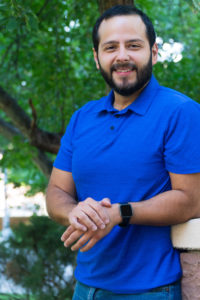
If you seek services from a therapist and plan to use health insurance, you will most likely walk out of your first session having been diagnosed with a “mental disorder.” In the experience of Colorado State University Social Work Ph.D. Student Arnold Cantú, this model of mental health that pathologizes the individual often does more harm than good.
Cantú’s research falls under the domain of critical perspectives of mental health, which presents pushback on the current biomedical model that frames mental health care similarly to physical health care – where mental health problems are labeled as diseases that need to be cured, often with pharmacological treatment.
“I’m interested in exploring, expanding, and advocating for formal alternative ways that people can have their emotional, behavioral, and psychological difficulties named and validated while honoring how environmental and circumstantial factors can be highly influential,” said Cantú.
Learning limitations, and what lies beyond them
“In the U.S., a psychiatric diagnosis is typically required by insurance companies or Medicare/Medicaid to help cover the cost of mental health services, such as counseling and psychotherapy,” said Cantú. After earning his Master of Science in Social Work at The University of Texas at Austin, Cantú worked in two positions that allowed him to see what it is like providing mental health care when insurance is billed, and when it is not.
First, Cantú worked as a school social worker in a charter school in Austin, Texas. Then, he worked as a therapist for children and adolescents and their families in an outpatient clinic in Albuquerque, New Mexico. Working in the charter school, Cantú provided direct services; insurance was not billed.
“So, I never had to ‘diagnose’ a child,” Cantú said. “Instead, I saw them as who they were: a child with understandable problems impacting their schooling.”
Later, when working in a hospital-affiliated clinic where insurance was billed, Cantú said, “I began to experience a conflict between being able to slowly understand and get to know my kids’ complex stories while simultaneously having to dictate their story for them through the diagnosis I had to bill.”
Seeking an alternative
Cantú said that the labels and diagnoses required by insurance companies made things murky, confusing, and difficult for children and their families. “I did my best to educate them on the history and development of [labels for] mental disorders, usually to the chagrin of my colleagues.”

Eventually, Cantú felt enough cognitive dissonance in his work that he decided he should do something to help address this issue. A doctoral program seemed like the most reasonable next step. After immediately clicking with Shannon Hughes in CSU’s School of Social Work, he applied to the Ph.D. program where one of his main research interests is to “help develop or improve alternative systems of classification to be used in mental health.”
“I want to help shift the paradigm away from primarily focusing on ‘what’s wrong with you?’ towards one where we patiently sit with the question of ‘what’s happened to you?’ and listen to people’s stories in a more humanistic way,” said Cantú.
Cantú’s goal is for there to be a “non-medicalized alternative and pragmatic system of classification to be developed and accepted in contemporary healthcare.” He is aware that this is a large, wicked problem with many entrenched systems and institutions that would have to fundamentally change, including the health insurance industry.
“My dissatisfaction with the current system of mental health care is not novel. Critiques stem from at least the 1960s,” he said. Cantú argued that change must be made to provide better care to clients. “We can do a better job of helping people feel validated without providing a scientifically questionable psychiatric diagnosis.”
Social workers as change agents
In a first concrete step toward this vision, Cantú had a paper accepted for publication in the journal Ethical Human Psychology and Psychiatry, titled “It is Time to Replace the DSM: A Critical Review of Social Work and the Biomedical Model of Practice,” which he characterizes as “part opinion piece, part literature review.” In it, Cantú posits that as social workers are the largest faction of mental health professionals in the country, and are bound to a shared code of ethics, they are specifically poised to be agents of positive reform. To bolster his argument, Cantú synthesizes decades of research and literature chronicling “how labeling people as having a ‘mental disorder’ is arguably more harmful than helpful.”
“Although my hope is for many practitioners and researchers – and the general public – to read it, I really hope my colleagues within social work give it a chance,” Cantú said. “If more people begin to believe how the current system we are operating in conflicts with our ethics and want to do something about it, that will be good enough for me.”
Cantú recognizes that learning about these critical perspectives can feel destabilizing, and has provided two resources to further your learning beyond this article. If you would like to explore this topic more, Cantú recommends the Learn/Unlearn webpage from The Inner Compass, and the Unrecognized Facts webpage from The Council for Evidence-based Psychiatry.
The School of Social Work is a part of CSU’s College of Health and Human Sciences.